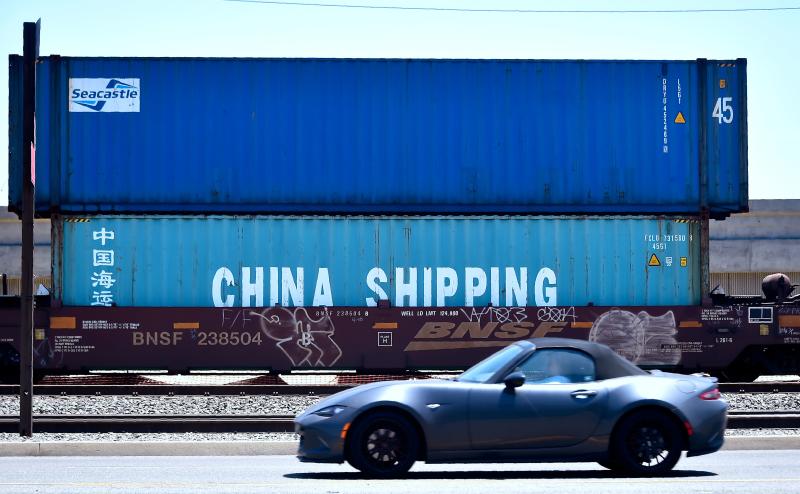Beijing complains to WTO over Trump tariffs, while US hits back at allies, China on metal duties
Sign up now: Get insights on Asia's fast-moving developments

Shipping containers, including one from China Shipping, await transportation on a rail line at the Port of Long Beach on July 12, 2018 in Long Beach, California.
PHOTO: AFP
Follow topic:
BEIJING/WASHINGTON (CHINA DAILY/ASIA NEWS NETWORK, BLOOMBERG) - China on Monday (July 16) lodged an additional complaint to the World Trade Organisation (WTO) regarding the United States' proposed tariffs on US$200 billion (S$272 billion) worth of Chinese imports, the Ministry of Commerce said in a statement.
It followed the recent complaint that the ministry filed on July 6 to the WTO about the US' early round of levies on US$34 billion worth of Chinese goods.
US tariff hikes targeting Chinese goods were based on Section 301 of the Trade Act of 1974, its domestic trade law.
"The US' unilateral initiation of a trade war has no international legal basis at all," the ministry said last week in a point-by-point response to the US statement under Section 301.
The US unilaterally launched a Section 301 investigation against China last year despite opposition from China and the international community.
It released an investigation report in March, and imposed tariffs on US$34 billion worth of Chinese goods on July 6 in disregard of 91 per cent opposition in the comments it received.
"The (US) tariffs are typical unilateralism, protectionism and trade bullying. They are a clear violation of the basic WTO principle of most-favoured-nation treatment as well as the basic spirit and principles of international law," the ministry stressed.
Mr Wan Zhe, chief economist of International Cooperation Centre with the National Development and Reform Commission, said the real intention of the US government initiating trade conflicts with other countries is to distract attention from its internal contradictions, such as the wealth gap and job losses.
Against such a backdrop, what China should do is to continue to push ahead with economic reform and opening-up, and work with the rest of the world to support free trade and multilateralism, Mr Wan said at a recent seminar.
Senior researcher Dong Yan at the Chinese Academy of Social Sciences said China should firmly uphold the multilateral trading system while sticking to its established agenda of further opening-up.
Meanwhile, the Trump administration is also hitting back at what it considers unjustified retaliatory tariffs that were imposed in response to US steel and aluminium duties.
The US Trade Representative said it launched formal challenges at the WTO on Monday against China, the European Union, Canada, Mexico and Turkey for retaliating against steel and aluminium tariffs.
The Trump administration earlier this year imposed 10 per cent duties on aluminium and 25 per cent on steel after finding imports of the metals pose a risk to national security.
"Instead of working with us to address a common problem, some of our trading partners have elected to respond with retaliatory tariffs designed to punish American workers, farmers and companies," US Trade Representative Robert Lighthizer said in a statement.
Mr Lighthizer said the US would take "all necessary actions" to protect US interests and urged trading partners to "work constructively" with the Trump administration to address overcapacity in both metal sectors.
Canada, China, the EU, Mexico and Turkey have imposed retaliatory tariffs on US$23.4 billion worth of US goods in response to Mr Trump's tariffs on steel and aluminium.
A European Commission spokesman said that while the bloc's decision to retaliate was proportionate and WTO-compatible, the US is entitled to seek an independent review in which the European Union will explain and defend its position.
The Canadian government said its tit-for-tat tariffs are allowed under the rules of the WTO and North American Free Trade Agreement.
"The tariffs imposed by the United States on Canadian steel and aluminium are unacceptable and illegal," Mr Adam Austen, the spokesman for Foreign Minister Chrystia Freeland, said in an e-mailed statement on Monday.
The Mexican government said in a statement that it will look at the US request with the goal of answering it in the next 10 days.
The US' national-security rationale for its steel and aluminium tariffs was unjustified, according to the statement, and Mexico's response was a reaction to that. The Mexican government promised to continue to defend its national interest.
The Trump administration has criticised the WTO for encroaching on US legal sovereignty and failing to rein in China's alleged violation of global trading rules. Mr Trump himself threatened to take action against the WTO earlier this month after Axios, a news service, reported that his administration had drafted legislation to withdraw the US from the organisation, a move the president repeatedly told advisers he was considering.
The WTO has "not worked well, or not as well as it was intended to work when China was brought into the WTO in the year 2000", Treasury Undersecretary for International Affairs David Malpass said at an event in Washington on Monday.
The US wins 87 per cent of the cases it brings to the WTO against other countries and loses 75 per cent of the cases other countries bring against Washington, according to a Bloomberg analysis of the 524 cases lodged at the Geneva-based organisation since it was founded in 1995 as the successor to the General Agreement on Tariffs and Trade.
Both figures are better than the average for all nations.

